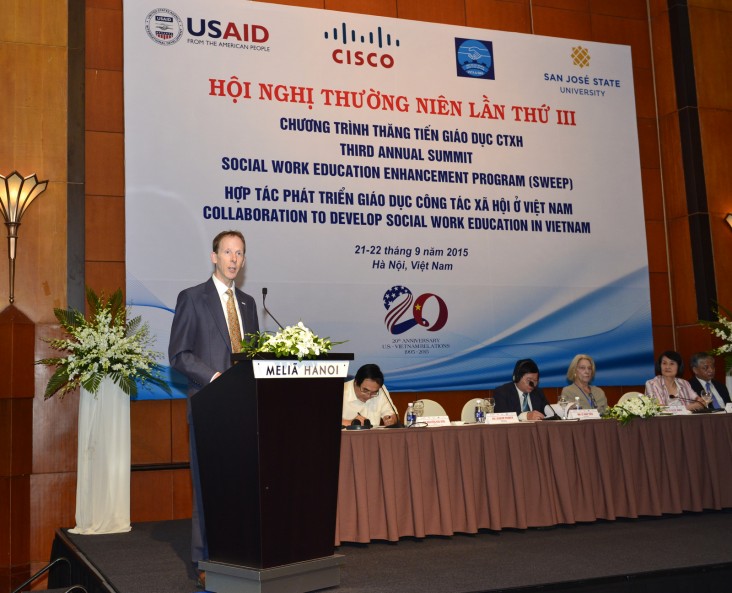
HANOI, September 21, 2015 -- I am pleased to join you today in this third annual summit on social work eduation.Vietnam's reforms and rapidly developing economy over the past 20 years has given the people of Vietnam many good things. Poverty has been significantly reduced and many families can achieve comforts and experiences that were hardly imaginable before. In many ways this country is a true success. During the same period, however, Vietnam has been increasingly confronting a range of familiar social issues associated with modernization, rural-urban migration, and other pressures on families.
The government has not ignored these issues, which is partial explanation of Vietnam’s success with the MDGs. Decree 1215 on mental health and Decree 32 on social work are evidence of its attention to diverse social welfare needs. Social protection centers, social work centers, and drug treatment programs are being established to provide care for persons with disabilities, including mental health patients, the elderly, drug users, and neglected or homeless children. All of these critical services require well trained professionals such as doctors, nurses, therapists, and social workers.
Vietnam needs social workers who are trained in scientific social theories and who have sufficient practice. This is where USAID is proud to be involved with both SWEEP and with programs that address social needs. In 2012 we chose San Jose State University as a partner to use U.S. assistance to enhance social work education in support of the government's ambitious plans for a robust social work profession. Social work is relevant to many of our assistance objectives.
Even though it is fairly new, social work education in Vietnam has made important progress. The indigenization of social work is a process and will not happen overnight. It is also natural that any country would use relevant models from others, including the United States. Vietnamese social work leaders and educators are taking on the challenge.
In fact, I know that many of you have engaged with social work in countries as diverse as Germany, Canada, and South Korea—each of which brings its own traditions to the field. Playing a major role in this collaborative effort, SWEEP is bringing the newest developments in social work education to eight Vietnamese partner universities, which are strategically located in North, Central, and South Vietnam.
During the past three years, SWEEP has innovated with pioneering leadership training, faculty development, and curriculum focused on initiating a competency-based education model for social work. Building towards increased sustainability, the project is providing support for Vietnamese faculty at the eight universities to share experiences with others who did not have the chance to directly participate in training in the U.S., as well as to faculty of non-SWEEP universities.
The first three of these trainings have just been recently provided in August in HCMC by Dalat University, Dong Thap University and HCM National University; then in Septemebr in Hanoi by the University of Labor and Social Affairs and Hanoi National University; and also this month in Hue by Vinh University and Hue University. These pilot trainings can be valuable opportunities for partner universities to collaborate with one another to continue their efforts after the project is completed for the common goal of enhancing social work education for Vietnam.
Sustainability will be possible with the continuing work of leaders from the partner universities as well as from the School of Social Work Associations. We can look ahead to exploration of models for effective collaboration and social work education at the university and national levels.
Collective leadership after SWEEP concludes will be vital, and we encourage use of strategies in place, such as creating a leadership organization, developing and sharing financial and human resources for social work education, setting an agenda for organizational sustainability, organizing stakeholders to implement competency-based educational standards, and effectively using technology to accomplish the Leadership Group’s objectives.
The summits supported by SWEEP in HCMC, Dalat and here provide opportunities for all universities in Vietnam to learn from the experience facilitated through SWEEP. Today's event represents an important milestone for Vietnam – the establishment of a national set of standards for social work education competencies. All of these developments prove that with cooperation in strategic areas, Vietnam is quite able to progress quickly on its social work goals.
It is fitting that during the 20th anniversary of the normalization of U.S.–Vietnam relations the dissemination of social work education practices is taking place on a national level, which indicates a high level of collaboration between the two countries.
I would like to wish you a productive and useful summit on a topic of crucial importance.
Related Speeches
- Remarks by Assistant Administrator Jonathan Stivers at The Stimson Center
- Remarks by USAID Mission Director Joakim Parker at the Launching Ceremony for New Disability Programs
- Remarks by USAID Mission Director Joakim Parker at the ‘Advancing Prosperity: Twenty Years of U.S.-Vietnam Development Cooperation’ Event







Comment
Make a general inquiry or suggest an improvement.